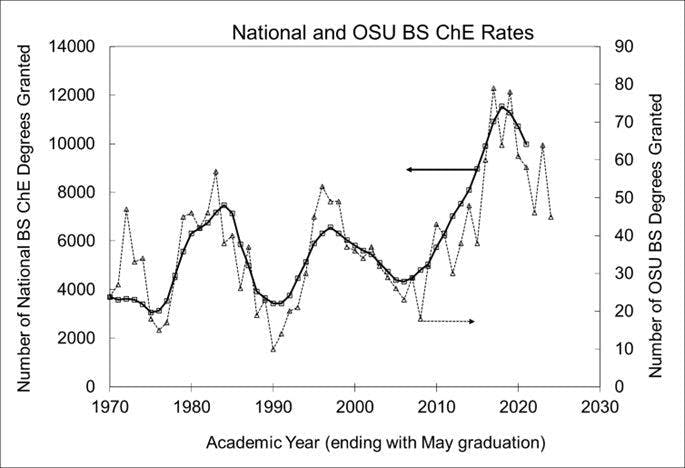The process industries rely on chemical engineering graduates for entry-level hires. Unfortunately, chemical engineering undergraduate enrollment cycles over about a 15-year period at a 2:1 amplitude ratio. Currently, graduation rates are in a downward trend, which will make hiring entry-level employees very competitive. You might recall how it was in the late 1970s, and again in 1990 and 2007. So, what can give your company a hiring advantage?
Figure 1 shows data for national and Oklahoma State University (OSU) chemical engineering (BS ChE) degrees. The national data (solid line) is from the National Center for Education Statistics’ (nces.ed.gov) Digest of Education Statistics. It takes about three years for NCES to collect, vet and publish, so the most recent data is from 2021. The OSU data is from university records (dotted line), and ends with 2024 as the most recent academic year.
OSU graduations cycle in-phase with the national data. A 2001 study on 30 other ChE programs (diverse regions, size and research reputations) during 1970-98 found that all 30 programs also cycle in-phase. The OSU data (three years more up to date) is a leading indicator of the continuing downward trend in the BS ChE graduation cycle.
The cause for the cyclic trend has been debated. Regardless of why, the evidence shows it regularly cycles with the long persistence of the upward or downward trends. By contrast, national employment of chemical engineers has not cycled. It’s consistently grown over time, and the U.S. Dept. of Labor forecasts the average demand for ChE graduates will grow steadily over the next decade.
At peak graduation rates, employment demand at OSU was about 90% of BS production, and industry enjoyed the employee selection. At minimum graduation rates, employment demand at OSU was about twice BS production, and industry scrambled to fill positions. Some companies made two offers for each opening, hoping to get half of the acceptances to fill their positions.
What are some effective actions to access new employees when demand far exceeds supply?
Academic administrators, whose personal success depends on bringing money into the university, say the best way to increase graduates is to give scholarship money. This might have an impact on matriculations next year, which would generate graduates in five or so years. And it would make parents grateful, but not engender allegiance to a company by students who didn’t get its scholarships.
In my experience as a ChE program head, the best way to access employees is to participate in students’ education. Active involvement by industry personnel in the program in a manner that supports students’ career preparations generates allegiance, which gives industry sponsors an advantage in recruiting.
Industry initiatives to create a win-win-win for the sponsors, students and the academic program include:
Internships
Hire undergraduates, who have finished their sophomore and junior years, as summer interns. Offer them meaningful engineering tasks, so you benefit, and the students feel valued and competent.
Select intern supervisors, who can provide guidance, comfort and affirmation. Provide a social, or two, with all interns and supervisors. Have a midsummer “How are we doing?” meeting. Have an end-of-session presentation by all interns, and a celebration of the students’ futures.
This is an opportunity to preview student ability and decide who you might want to offer permanent employment.
In my experience, most interns find careers in other companies as their life plans change over the next two years. Don’t expect interns to be obligated to accept a position with you. If they don’t, it’s not an insult to your company or a condemnation of the supervisor. What matters to you is what they say about their intern experience to their classmates when back in school. If they had a pleasurable total experience, then they’ll promote your company, providing you a recruiting advantage at the program.
Co-op programs
In these programs, students work continuously for a semester and a summer as junior engineers. The longer period permits them to be more productive than summer interns, providing greater value to both employer and the student’s sense of accomplishment and self-worth. But the missing semester (or quarter) may be disruptive to graduation plans or criteria for being a full-time student. Be sure to plan a co-op program with university administrators. The recruiting benefits are the same as with internships.
Support student chapters
Host a start-of-the-year welcome picnic or end-of-the-year congratulations picnic with brief celebratory speeches and time for your representatives to mingle with students. Send early-career employees, who can connect with the students. Provide evening speakers for student chapter meetings to talk about how industry handles problems and applies ChE knowledge. And, of course, offer dinner (pizza, subs, etc). Host field trips with explanations about your site and tours, using several employees each with a small group of students (and, of course, lunch).
Classroom lecturers
Provide guest classroom lecturers, who can discuss projects that support course topics, and that are out of the course instructor’s expertise. These might include dimensionless group modeling, process safety, troubleshooting a distillation process, upgrading a control system, diffusion degradation in semiconductors, how paper is made, economic evaluation methods, data reconciliation, non-ideality in orifice calibration, determining reaction kinetics, coordinating large projects, etc.
Host Chem-E-Car activities
The American Institute of Chemical Engineers (AIChE) hosts the Che-E-Car competition, which engages college students to design and construct a car powered by a chemical energy source. You can provide funds for supplies and student travel to regional and national competitions, offer personnel to perform safety reviews of student plans, send employees to judge posters, and give awards at the local competition.
This is a great way to participate in success and excitement, affirm student creativity and effort, discuss parallels with industry projects, encourage the non-winners, and provide advice on learning lessons from unsuccessful efforts.
Host a welcome dinner
Host a welcome dinner for those entering their junior or senior years. Such a reception serves to affirm their hard work and for making it this far. It encourages students on their future in the control and process industries. Use upbeat speakers. Offer students a gift of Perry’s Chemical Engineers’ Handbook or something your process engineers would find useful in supporting the students’ diverse future careers.
Support the unit operations lab
Provide equipment (perhaps something lab-scale or pilot-scale that’s no longer useful, or something that you can make in your shops). Also, provide technical support for installation and operation. Discuss what to donate with the university’s instructors, so that it’s compatible with program needs. Send employees to provide feedback on students’ oral presentations about their projects. Give employees the time to drop-in to greet students during their lab sessions.
Support the senior plant design course
Provide a challenge problem, perhaps on a unit that’s operating below desired performance. Discuss the challenge with design instructors. Provide several employees to attend and give feedback to students’ oral presentations and design reports. They don’t need to grade the reports, but their comments on style, creativity and application of fundamental principles will help the students and faculty.
There’s no need to promote your company during such activities. Students want to learn skills and acquire perspectives that will give them a career advantage. They want to see employees that enjoy their contributions. Give them that because if you do, the students will promote your company. Be sure that upper management understands how to perceive the return on investments such as those listed.
Be sure to structure participation with faculty. Industry managers have developed a perspective about how business works, and they also retain their student perspective about how a university works. Neither perspective has much to do with the perspective of faculty in academic environments. The faculty view includes excellence in teaching fundamentals and relevant career preparation; but more importantly, as independent agents within the university, faculty development of a research program of international reputation is primary.
Unlike businesses, academic administrators don’t assign projects to faculty. Be sure any involvement in the program requiring faculty participation is supported by the associated faculty, who will volunteer to give it their time. Use the department head (chair, director) as your entry point.
About the Author
R. Russell Rhinehart
Columnist
Russ Rhinehart started his career in the process industry. After 13 years and rising to engineering supervision, he transitioned to a 31-year academic career. Now “retired," he returns to coaching professionals through books, articles, short courses, and postings to his website at www.r3eda.com.
Sign up for our eNewsletters
Get the latest news and updates

Leaders relevant to this article:


